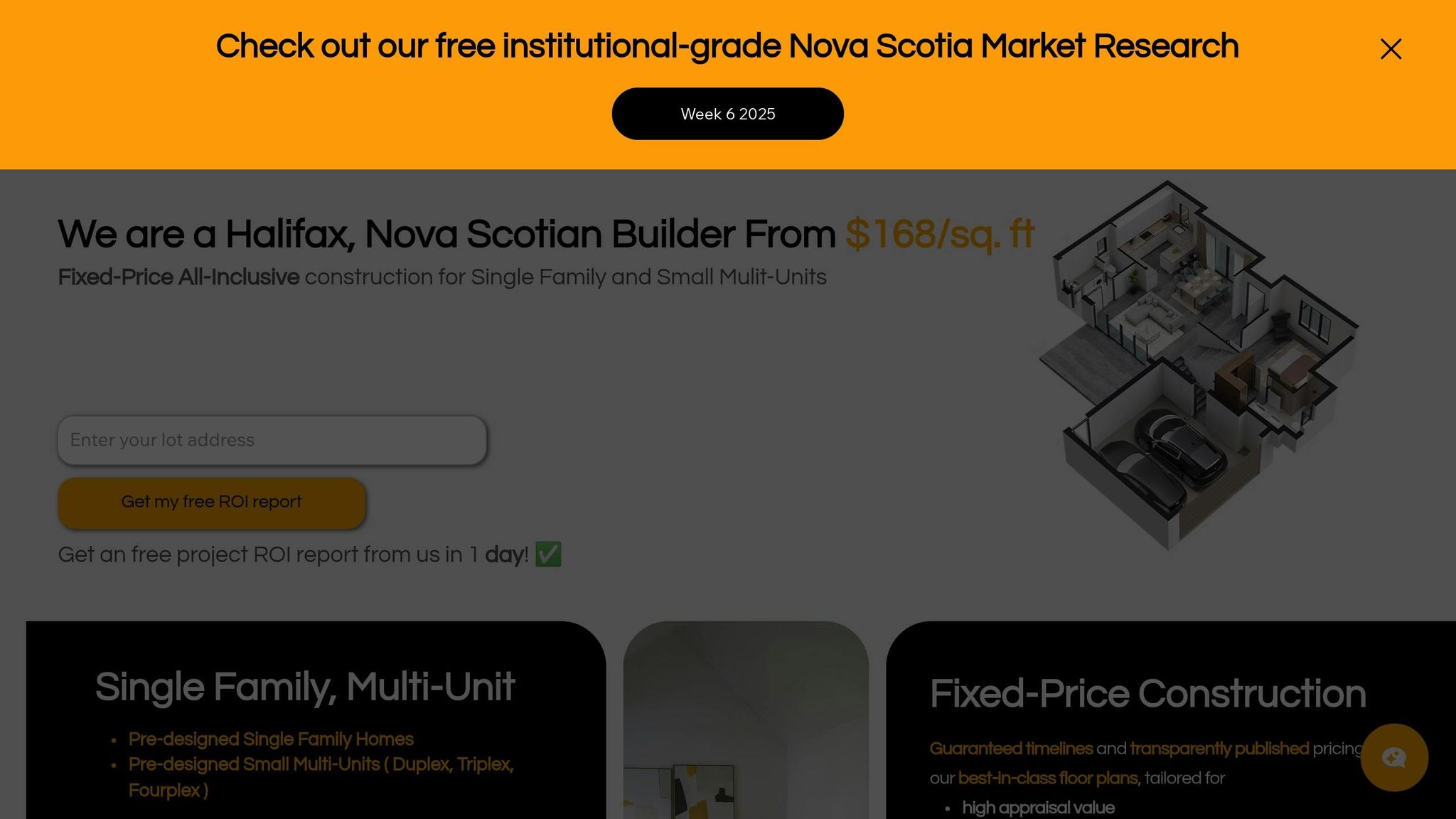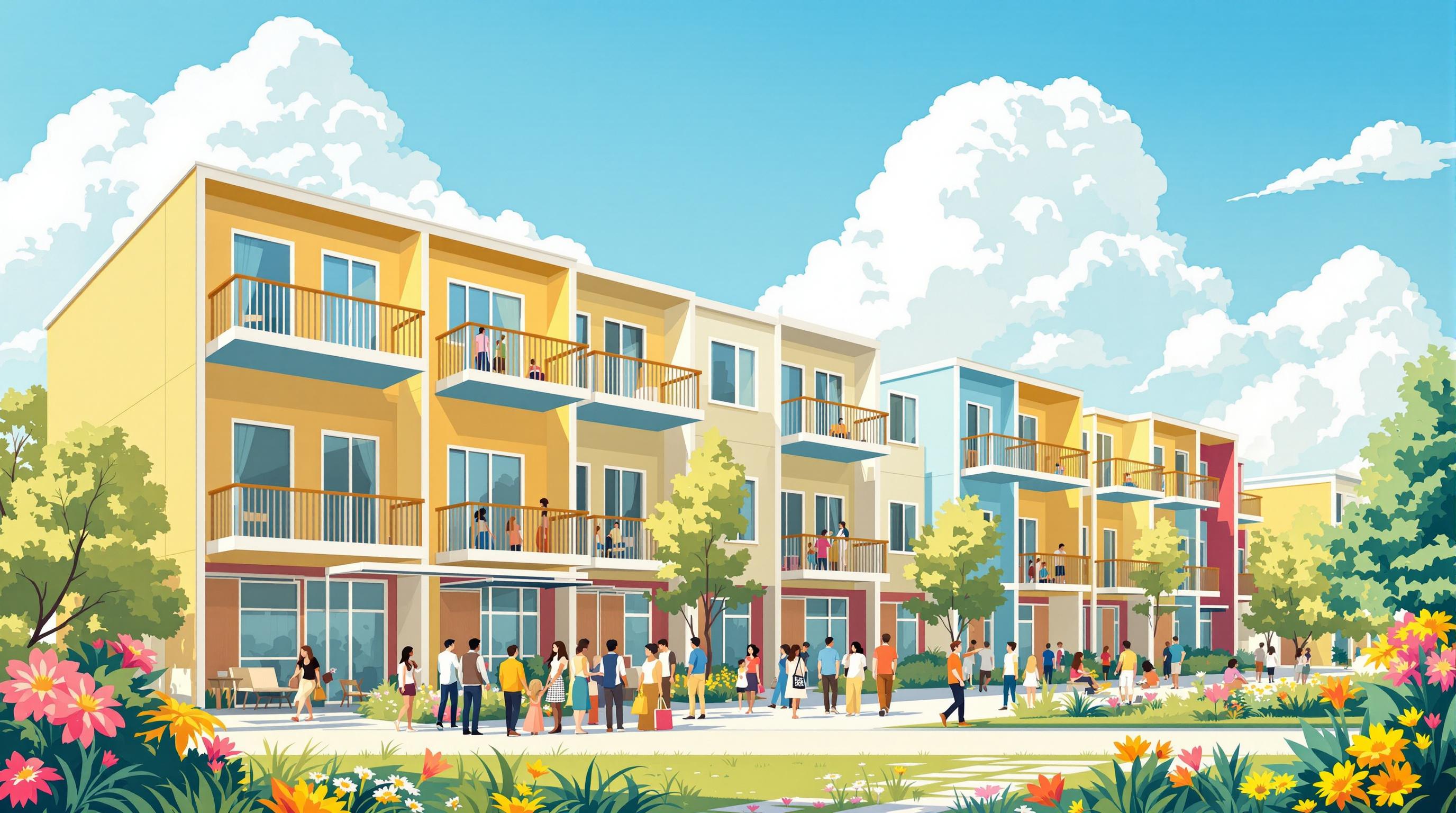Federal Grants for Multi-Unit Housing in Nova Scotia
Nova Scotia is addressing its housing crisis with federal grants designed to boost affordable multi-unit housing. These programs are part of Canada’s $72 billion National Housing Strategy. Here’s what you need to know:
- Funding Programs: Key grants include the Affordable Housing Development Program, Community Housing Acquisition Program, and Nova Scotia Community Housing Capital Fund.
- Eligibility: Projects must include at least 5 affordable units, maintain affordability for 15+ years, and set rents 20% below market rates.
- Application Process: Developers must meet equity requirements (20% for private, 5% for community housing), submit detailed budgets, and pass a multi-step evaluation.
- Success Stories: Over 1,100 affordable units have been created in Nova Scotia, with funding supporting projects like modular homes for Membertou First Nation.
Federal grants can cover up to 50% of costs (or 100% for smaller projects). Start by reviewing eligibility criteria and preparing financial documents to secure funding for your housing project.
Affordable Housing Grants Virtual Q&A
Main Federal Grant Programs
The federal government has three key funding programs aimed at supporting multi-unit housing developments in Nova Scotia. Each program is tailored to meet specific housing needs and challenges.
National Housing Co-Investment Fund Details
The Affordable Housing Fund provides a total of US$10.34 billion for housing infrastructure. It offers low-interest and forgivable loans for new construction, renovations, and community housing repairs.
By September 30, 2024, the fund had committed to creating 40,501 new units and renovating 166,889 existing units. This accounts for 67.5% of its 60,000 new-unit target and 98.2% of its 170,000 renovation goal [3].
Another important program under this umbrella is the Rental Construction Financing Initiative, which focuses on purpose-built rental housing.
Rental Construction Financing Options
This initiative is designed to support the development of rental housing specifically for middle-income families. In Nova Scotia, substantial progress has been made:
| Project Location | Units | Investment |
|---|---|---|
| Halifax/Bedford/Truro | 710 | over US$286 million |
"With the support of the CMHC Rental Construction Financing initiative Northwood has been able to bring to life another affordable housing project for seniors at a time when there is a critical need for affordable housing in the province. We are so thankful for this support!"
– Janet Simm, President and CEO, Northwood Corporate [4]
Rapid Housing Initiative Programs
The Rapid Housing Initiative (RHI) speeds up the delivery of affordable housing by using modern construction methods. Its third round includes a US$1.5 billion investment, aiming to create at least 5,200 affordable homes across Canada [5]. Key program features include:
- A 20-year affordability requirement
- Projects must be completed within 18 months (24 months for northern and remote areas)
- Priority for "shovel-ready" projects
- 25% of investments dedicated to housing for women
In Nova Scotia, the Membertou First Nation project stands out as a success story. In January 2024, the project received over US$9 million to build 32 affordable modular homes. The funding included:
- US$8.25 million from the RHI
- US$665,000 from Indigenous Services Canada
- US$1.12 million from Membertou First Nation equity
"In Membertou, we are incredibly grateful for the opportunity to be recipients of the Rapid Housing Initiative funding, which will see 32 new housing units for our community built over the next year... this initiative directly supports families in our communities to have their forever home."
– Terry Paul, Chief and CEO, Membertou [5]
The Halifax region is also benefiting from RHI funding. For example, the Society of Saint Vincent de Paul is developing a 38-unit affordable apartment complex, scheduled for completion in November 2024 [6].
sbb-itb-16b8a48
How to Qualify and Apply
Securing federal grants in Nova Scotia requires meeting specific criteria and following a structured application process.
Basic Requirements
Private developers need to cover 20% of eligible capital costs, while community housing groups must contribute at least 5% in cash or through unencumbered land [2].
To qualify, applicants must meet these conditions:
- Be registered and in good standing with the Registry of Joint Stock Companies.
- Have at least 5 years of experience or partner with a professional property management firm.
- The project must be located in Nova Scotia (excluding reserves), offer 12-month tenancies, and meet energy efficiency and accessibility standards.
- The construction site must be free of flood risks and have the necessary environmental approvals [2].
Once these criteria are satisfied, you can move forward with the application process.
Application Steps
After confirming eligibility, follow these steps to apply:
| Stage | Requirements |
|---|---|
| Initial Review | Review the program guide and discuss the project. |
| Specialist Assignment | Work with a dedicated housing specialist for guidance. |
| Proposal Development | Prepare the Capital Costs and Pro-Forma Operating Budget. |
| Pre-evaluation Check | Ensure the proposal meets initial eligibility requirements. |
| Final Evaluation | Undergo a detailed assessment of the project proposal. |
Once conditionally approved, developers have six months to complete outstanding requirements and sign the Project Contribution Agreement with the Department of Growth and Development [2].
Avoiding Application Errors
To improve your chances, avoid these common mistakes:
- Incomplete Documentation: Ensure your financial statements are current and thorough [7].
- Missed Deadlines: Register on application portals and complete necessary steps well before deadlines [7].
- Misalignment with Program Goals: Projects must include affordable rental units priced at least 20% below the average market rent, offer extended affordability periods, and demonstrate strong social and environmental benefits [2][8].
Having an external reviewer go over your application can help catch errors and improve your submission [7].
Making the Most of Federal Grants
Multi-Level Grant Programs
You can secure more funding by mixing federal, provincial, and municipal grants. By combining these sources, housing projects can gain broader financial support.
| Funding Level | Program Example | Maximum Support |
|---|---|---|
| Federal | National Housing Co-Investment Fund | Depends on the project |
| Provincial | Affordable Housing Development Program | Up to 50% of rental units |
| Municipal | Local incentives and tax rebates | Varies by municipality |
To make this work, your project needs to align with each program’s goals. For instance, the Affordable Housing Development Program can cover up to 50% of rental units in larger projects or even 100% for projects with fewer than 10 units [2]. This approach has already delivered real results, as seen in recent housing initiatives.
Success Stories
Nova Scotia has seen impressive outcomes from these funding strategies. A combined federal-provincial investment of over $916,000 went to community housing organizations, contributing to the province's larger $35 million commitment. This effort has led to the creation of over 1,100 new affordable housing units [1].
Helio Urban Development Services

Developers can boost their projects’ feasibility with help from Helio Urban Development. They offer fixed-price, pre-designed multi-unit construction at $168 per square foot. Their duplex, triplex, and fourplex models are designed to meet grant requirements by focusing on:
- Energy efficiency that goes beyond standard building codes
- Accessible designs to support inclusive housing
- Cost-effective layouts that don’t compromise quality
To qualify for the highest level of grant funding, projects must:
- Keep rents at least 20% below market rates
- Commit to affordability for more than 15 years
- Include at least five affordable units
- Surpass building code standards for accessibility and energy efficiency [2]
The federal government is also expanding its housing programs. Initiatives like the Canada Builds partnership and the Canada Rental Protection Fund provide additional chances for developers to access low-cost financing tied to public land [9].
Summary and Next Steps
Federal grants in Nova Scotia can cover up to 50% of eligible costs for qualifying projects - or even 100% for projects with fewer than 10 units [2].
Here’s how to get started with your application:
1. Understand the Program Requirements
Before applying, check the 'How to Qualify and Apply' section for detailed eligibility criteria. Your project must meet these key conditions:
- Include at least 5 affordable rental units
- Commit to 15 years of affordability
- Set rental rates 20% below market
- Be located within Nova Scotia (excluding reserves)
- Be registered with the Registry of Joint Stock Companies [2]
2. Organize Your Financial Documents
You'll need to submit a Capital Costs breakdown and a Pro-Forma Operating Budget to prove your project’s feasibility. Here's a quick overview of equity requirements based on your developer type:
| Developer Type | Required Equity | Form of Contribution |
|---|---|---|
| Private | 20% | Cash or land |
| Community Housing | 5% | Cash or land |
For those seeking cost-effective builds, Helio Urban Development offers pre-designed, fixed-price multi-unit projects at US$168 per square foot for investor-grade developments.
Final Steps
Once your documentation is ready, submit your complete proposal package. An affordable housing specialist will guide you through the evaluation process. Projects may also qualify for added support through the National Housing Co-Investment Fund.
Send your proposal via email to begin the review. If approved, you’ll receive a conditional approval letter and a Project Contribution Agreement, which outlines the milestones to meet within six months [2].
